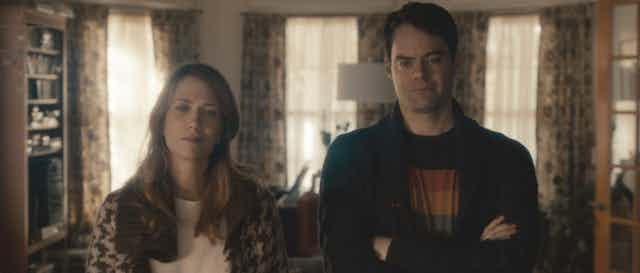As the Melbourne International Film Festival draws to a close for another year, what better way to finish than with a comedy? Well, not quite. Craig Johnson’s latest release, Skeleton Twins, starring Kristen Wiig and Bill Hader exists somewhere between tragedy and comedy, perhaps leaning more towards the dramatic family crisis side of the spectrum.
The film follows Milo’s (Hader) unexpected reunion with his twin sister, Maggie (Wiig) after ten years of separation. The film opens with not one but two suicide attempts. That tells you a lot about the dark comic tone that Johnson maintains throughout this ambitious film, his second feature.
Twins like these
Wiig and Hader are excellently cast and convincingly play the troubled “Skeleton Twins” from the film’s title. There were rumours circulating that Anna Faris had initially been considered for the lead role. It would have been a very different film had that been the case.
Wiig lends great emotional depth to the role and is compelling to watch. Her performance is beautifully complemented by Hader as her sarcastic, guarded but magnetic brother. Their infectious banter and natural dynamic really carries the film and particularly shines through when they lipsync Starship’s “Nothing’s Gonna Stop Us Now” and in their nitrous-oxide fuelled antics in Maggie’s dental clinic. The film also features Luke Wilson as Maggie’s enthusiastic but simple-minded husband, Lance, and Ty Burrell as Milo’s sometime lover, Rich.
Bigger questions
The film is primarily concerned with Maggie and Milo’s relationship however the little subplots with Lance and Rich are neatly executed. They allow for the discussion surrounding dysfunctional families to be extended to broach broader questions about our desire for intimacy and the need to feel connected.
Maggie’s extramarital affair with her scuba-diving instructor and Milo’s attempt to rekindle a romantic relationship with his high-school teacher both experiment with this idea of a forbidden intimacy that hints at a deeper malaise.
There is something very bittersweet in these moments and some scenes are difficult to watch. Johnson tries to fit a lot into the script – and this is occasionally to the film’s detriment. Milo’s history with Rich is fascinatingly complex and the trauma of this illicit affair surfaces in Hader and Burrell’s strong performances. However there are many interesting extrapolations about the taboos governing this relationship that could have been further developed.
Flash back, flash forward
Johnson’s film is beautifully shot and expertly structured. The narrative seamlessly transitions from moments of light-hearted comic repartee to thoughtful reflections on the trauma of loss and painful transitions of life. This is both the film’s strength and its weakness: it acknowledges the complexity of these connections and miscommunications but its treatment of these important discussions sometimes feels a little rushed and under-developed.
The film regularly relies on childhood flashbacks to give context and emotional weight to the interactions between Maggie and Milo. These moments are a little heavy-handed. Johnson might have instead used the time to better explore these complicated dialogues surrounding mental illness and suicide.
In the recent aftermath of Robin Williams’ suicide, there has of course been renewed public discussion about the importance of openly acknowledging mental illness and ensuring that there are dialogues of support available for people in need. While Skeleton Twins provides an engaging and convincing study of depression and family trauma, some audiences may feel that its approach to suicide is insubstantial and perhaps even romanticised.
We often see mental illness tacked onto films and television shows as a plot device or as shorthand for a “complex” character. However, there does seem to be a growing trend to engage more meaningfully with the discourse surrounding mental illness. Comedies such as The Skeleton Twins can effectively bridge this divide and allow for difficult conversations about isolation to be brought to the fore.
Films such as Little Miss Sunshine (2006) and Silver Linings Playbook (2012) were both very well received by audiences and generated a lot of public discussion about depression. Johnson’s film is an entertaining and ambitious contribution to this discourse and will hopefully open up further reflection on the prevalence of depression.
The Melbourne International Film Festival 2014 runs until Sunday August 17. See all MIFF 2014 coverage on The Conversation here.

